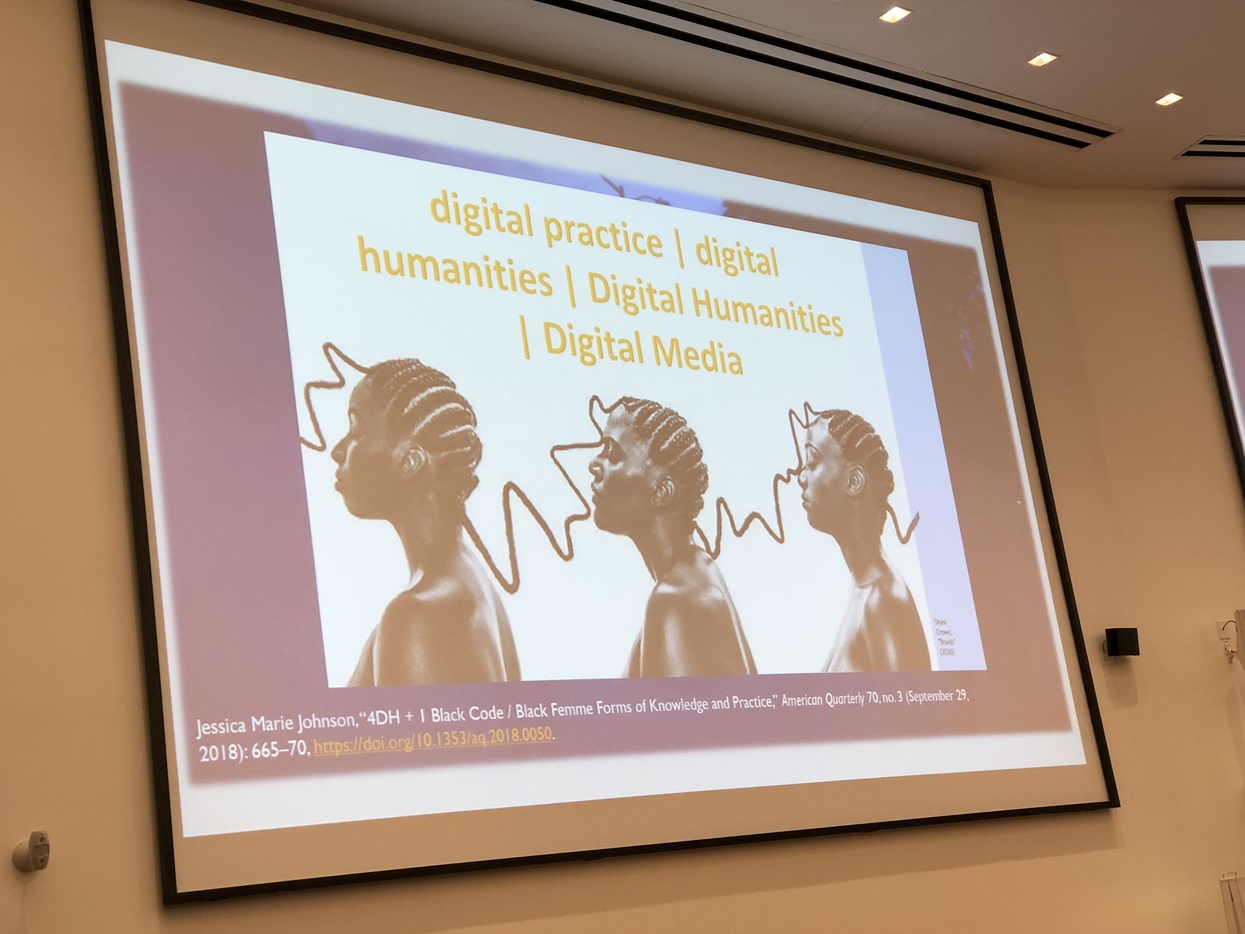Conference Grants: Grace Gipson and Malika Imhotep at ‘Intentionally Digital, Intentionally Black’

Grace Gipson and Malika Imhotep received a Fall 2018 BCNM Conference Grant to help cover their costs attending the African American History, Culture, and Digital Humanities Conference at the University of Maryland College. Imhotep was an attendee and Gipson presented “Exploring the Black Female in Comics Fandom Culture through Digital Storytelling.” Read more about their experience in Gipson's own words below!
As young researchers it is important that we find spaces that not only cultivate our learning, but are accessible and provide opportunities for future growth. And the conference space is one of those places where we are able to do both. Now don’t get me wrong depending on the size and type of conference it can be quite daunting, overwhelming, yet still exciting. Of the many conferences that I have attended, I can say that I have encountered a range of spaces. But this past October, I participated in a conference that truly made an impact on me professionally, academically, and socially.
These days the traditional call for papers can not only be heard by word of mouth or through an email listerv, but also in a 140-character tweet. As I was gathering Twitter data and checking out the latest Twitter news, I came upon a tweet from the African American History, Culture, and Digital Humanities (@UMD_AADHum) Initiative at the University of Maryland College Park advertising a save the date for their first annual conference “Intentionally Digital, Intentionally Black” conference. I knew that I had to take part whether simply attending or participating. And the timing was perfect as I had just finished up on my dissertation chapter on Black women in nerdom and their use of podcasts and blogs. Here was a conference that “intentionally” placed a focus on Blackness in the digital and addressed all the qualities (mentioned above) needed for a burgeoning digital scholar. This, especially for me, was important as I am diving into the job market pool and further embracing my academic talents.
As a scholar who is interested specifically in all things Afrofuturism, Black pop culture, representations of gender and race in comics, and the intersections of race and new media the 2018 “Intentionally Digital, Intentionally Black” conference proved to be a valuable tool. I was definitely in for a treat! Prior to the conference officially beginning, the conference team/committee provided various pre-conference opportunities to learn and gain first-hand experience with such workshops as Encoding for Black Lives: Moving from Analog to Digital Markup in African American Rhetorical History where participants were given an introduction to markup platforms such as Text Encoding Intiative (TEI), HTML, and CSS, while also becoming familiar with open-source software programs and platforms like Atom text editor, GitHub, and GitHub Desktop. Other pre-conference workshops included: QSR NVivo Training for Humanities Research, Umbra Search and the Future of Black Digital Platforms, and Supporting Black DH Work in the Academy. As the field of digital humanities (DH) grows it is important that we invest in its growth and potential. The work of DH provides an opportunity to push the academic space, while also challenge and empower spaces beyond the academic classroom. Having these pre-conference activities was a great way to jumpstart the conference and prepare participants for what was in store. And for me personally, I was able to step out of my comfort zone by gaining new skills that would ultimately enhance my dissertation work and make me a stronger researcher overall.
The next two days of the conference would just pick up from that momentum and continue to raise the bar. Now Silicon Valley may be housed in California, but the Digital Humanities world was very much present in the DMV (District of Columbia, Maryland, and Virginia) area. What was most impressive was the array of topics covered, which included the intersections of disability, Afrofuturism, and fantasy, global digital movements, issues of equity and pay, valuing and monetizing content, restoring and maintaining the archive, the use of new media tools for activism, and so much more. Based on the selected panels, it was evident that the #AADHum committee was clearly intentional about each presentation ensuring that they cover all bases historical, primarily technology-based, popular culture, and having a global representation/impact. Without a doubt, based on the full sessions, participants were fully engaged and represented. It is always a great feeling when there are lots of panels to choose from versus not enough.
In addition, to inspiring poster/panel sessions and provocative, impactful keynotes, the conference made sure to incorporate various inclusive/accessible spaces, high quality smart-rooms, and an overall environment that did not overwhelm. From the quiet work spaces to the lactation rooms, ALL were welcomed; and as an added bonus the “swag bags” were filled with goodies and we were provided with exceptional snacks and meals (all palettes were satisfied gluten-free, vegan, and omnivores ☺). These things may seem minor, but are actually very considerate, thoughtful and ensure that people will return to future conferences. After such a successful conference, I can only hope that the conference will return in 2019 and build off the great energy that has been established. Looking to the future, I look forward to penning this into my calendar as a yearly event.
All in all, the 2018 “Intentionally Digital, Intentionally Black” exceeded my expectations and left me with a charge to continue pursuing and believing in the work that I do, and that it has much value. My Research Matters!! Furthermore, the new networks and relationships gained, and the already established ones from the conference left me feeling that any and all is possible. As a self-proclaimed Blerd, I found another space to blerd/geek out, a space where I felt accepted and welcomed, a space to push my work, and a space that I would return back.
